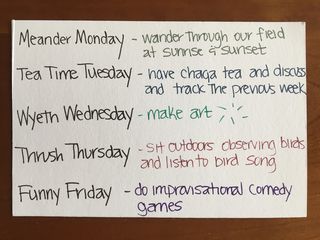Relationships
Love in the Time of Coronavirus
Six ideas to meet the challenges of endless togetherness.
Posted March 24, 2020

We have been called to stay home.
If we are lucky enough to live in a safe home with people we love, this shouldn't be too hard, but as many have quickly discovered, it can be. We are all under stress, with many under profound stress. We carry our unspoken fears privately. Minor irritations can turn into major tempests. We may be on each other's last nerve and feel desperate for a reprieve from endless togetherness.
With that said, there are ways to make this forced togetherness truly positive, so that our relationships and love may deepen profoundly.
To turn this stressful time into a powerful opportunity for greater #LoveInTheTimeOfCoronavirus:
1. Count your blessings and express your gratitude to one another. If you are living with people you love, remember how very fortunate you are. Consider this incredible good luck a call to build the happiest household you can during these challenging times.
Thank each other for the smallest of kindnesses. Pay attention to every good deed or effort. Focus intently on the positive and express it: out loud, in handwritten cards hidden under pillows, in unexpected videos sent by text. Challenge yourself to be as generous as you can possibly be. Pretend it's your loved one's birthday by showering them with kindnesses, and hold your tongue as much as possible as if it's their birthday, too.
2. Hug each other every day. Certain rituals, like a hug, kiss, and "I love you" when we leave or return from home, may disappear when we never leave home. So it's time to create new rituals. Alarm reminders can help you establish your new habits. Perhaps hugs in the morning and "I love yous" at night for everyone. A quick "verbal valentine" can also boost love. Add a family rule that anyone can ask for such a valentine whenever they need it, and the need will be met with expressions of love.

3. Build new activities into your week. When you're always at home, days can blend together and blur. My husband and I noticed this when he thought an event that happened two weeks ago had actually happened one week ago. So we created a weekly schedule during which we do a different activity each day for 30 minutes in order to differentiate our days.
On Meandering Mondays, we walk through the meadow where we live in rural Maine at sunrise and sunset and observe spring unfold. On Teatime Tuesdays, we have tea and recount our experience of the previous week to track the progression of the pandemic over time. Because we love the art of the Wyeth family, on Wyeth Wednesdays, we make art. On Thrush Thursdays, we use our Larkwire App to learn bird songs while sitting outside, catching glimpses of birds themselves. And on Funny Fridays, we play improvisational comedy games together.
What activities might your family do? Make your schedule and share it with others to spread the creativity!
4. Soothe your loved ones. While there are things we can do to transform our own pandemic dread, there are also things we can do to relieve each others' anxiety. We can give back rubs and foot massages. We can share a funny cartoon, cook a favorite meal, put on an awe-inspiring piece of music, or find a lighthearted comedy to watch online.
You know your loved ones best. What would give them a break from their fears? Do these things.
5. Give each other space. Even if we are home together, we can still create privacy. Give your loved ones the heads-up by expressing your need for alone time. If you have little ones, use nap time as your chance to be alone. For adults and older family members, listening to music or podcasts with headphones, journaling, reading, taking a bath, or spending time on a computer can allow us to retreat from those around us, even in tight quarters.
Doing things together but silently, like creating art or meditating, can have a restorative effect on our inner and outer lives. Even young children can enjoy sitting with family members for five minutes while listening to a guided meditation. By finding time and space for privacy, we can restore and renew ourselves, remain aware of our own emotions, and be at our best when we come back together.
This is especially important for more introverted family members, so remember to respect each other's space. Don't take it personally when someone retreats. After all, who doesn't appreciate a retreat?
6. Air grievances with a solutionary mindset. Solutionaries are people who identify problems, uncover their causes, connect with stakeholders impacted by the problem and/or its potential solution, and collaboratively devise solutions that do the most good and least harm for all. Imagine bringing such a mindset to family conflicts. Imagine really listening with the intent of finding answers that will improve life for everyone.
Such solutions won't necessarily be easy or obvious, but a family dedicated to being solutionaries—especially during this time—is a family likely to become ever more appreciative, connected, and loving. You might even experiment with taking on a community problem as a family of solutionaries, using this unique time together to see what a powerful force for good you can be!
Finally, to best experience #LoveInTheTimeOfCoronavirus, remember these words by Ralph Marston:
"When disaster strikes, there are no magic words that will make everything all right. For if there were, life would necessarily have to be unbearably empty and shallow in order to accommodate them. What there is, is the opportunity and the obligation to love as you never have before. What there is, is the stimulus to take life to a higher level. In your moments of most profound challenge, you are left with only what truly matters. And that is a powerful place to be. When you are forced to experience life at its worst, it compels you to be your best. You must call upon a level of strength you never before knew was there. And then, you begin to work through it. As you choose to move forward, life takes on greater, more profound meaning. Choose to love, and choose to live. That is what you can do, and that is where the real magic will happen."




